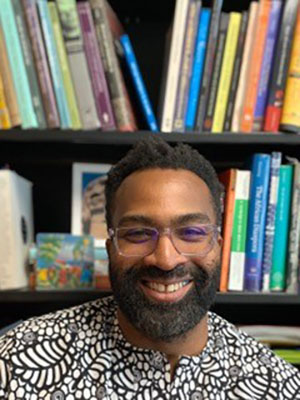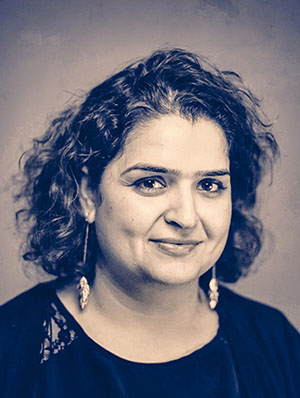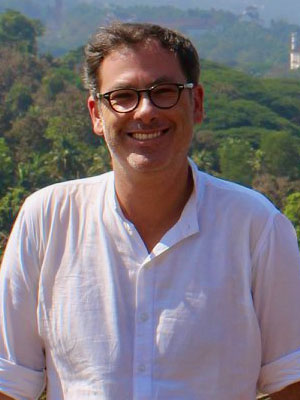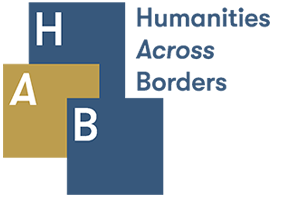Textile and Dyes as Transnational, Global Knowledge
The In Situ Graduate School on Textiles and Dyes will be held from 18-23 September 2022 in Leiden, the Netherlands.
For whom
The In Situ Graduate School on Textile and Dyes as Transnational, Global Knowledge is intended for Arts, Design, Social Sciences and Humanities graduate students (doctoral, including doctorate practice-based research, and research master's) and early career professionals (up to 3 years after the completion of the PhD). All applicants must be committed to or actively working on projects that engage with the ISGS theme.
Application
To apply for participation in the In Situ Graduate School 2022, please complete the online Application form. The application deadline is Friday 15 April 2022.
Selection procedure
The programme allows a maximum of 22 participants. Applicants will be informed of the committee’s decision by 1 June 2022 at the latest. The selection process will be based on the candidate’s application, and it seeks a balance in backgrounds. Please note that we will be unable to provide feedback and comments to those applicants not selected for participation.
Participation requirements
Selected participants agree to attend and participate in all events from 18-23 September 2022, including lectures, workshops, fieldtrips, and group presentations. Participants also agree to read pre-circulated background materials as generated by the Convenors (as relevant).
Language requirements
A working language of English is required and presentations will be in English. No translation/interpretation services will be available during the In Situ Graduate School.
Registration fee
Participants must pay the following registration fee: € 400.
Accommodation
Accommodation for seven nights (for participants residing outside of Leiden), six lunches and two dinners are included for the selected participants.
Travel costs
Selected participants are expected to fund their own travel expenses. Limited (partial) scholarships are available. For more information, please see Financial Support. We recommend that you try to raise funds to cover your transportation and/or other expenses as early as possible.
Payment
After you have received the confirmation of your participation, you will receive further information about the payment of the registration fee (due 1 August 2022). You can pay with credit card (Mastercard or Visa) or via bank transfer.
Certificate
Participants can receive a certificate for the In Situ Graduate School.
* The co-organisers reserve the right to modify the dates and general conditions of the ISGS should its logistics and safety of the participants be affected by the COVID-19 pandemic.
Our understanding of textile and dye crafts, both at the local and global levels, is invariably colored by colonial, national and post-war UN approaches to ‘development and rehabilitation’. More recently, the neo-liberal wave of institutionalizing art and culture through the frames of ‘heritage’ and/or ‘creative economy’ has begun to shape our ideas and sentiments about handmade textiles, clothing and dyes.
This ISGS invites applications from Arts, Design, Social Sciences and Humanities graduate students (doctoral, including doctorate practice-based research, and research master's) and early-career professionals (up to 3 years after the completion of the PhD). All applicants must be committed to or actively working on projects that engage with the ISGS theme.
In this LeidenGlobal-HAB-IIAS In Situ Graduate School (ISGS) we will aim to interrogate prevailing, dominant discourses through other, less visible, and marginalized vantage points, whilst focusing on three sub-themes:
1. Circulations of textiles and dyes along less visible cartographies
Scientific knowledge has been characteristically understood as ‘abstract’ knowledge, that is ‘universal’, and implicitly reliant upon the (hidden) extraction of surplus labor, often from racialized and gendered ‘others’. We know that indigenous Asian and African knowledge lay scattered among early modern botanists’, missionaries’ and colonial administrators’ reports, travel writings, and correspondences, as well as in the objects they produced and traded. But this occurred in an early modern, nascent capitalist context where knowledge was conceived as a privately owned commodity that should properly be harnessed to profit-driven commercial schemes. Can the script be flipped through a retelling and re-imagining of the trajectories of these itineraries? Which populations emerge as the important interlocutors of those long distance conversations? What are the distinct cultural contexts that come into view? What are the spatial relationships, environmental conditions, and technological limitations that become important to understand? The Indian Ocean worlds have long been connected, and there is much to be learned from the circulation of textiles and dyes, as it opens windows to an understanding of the flows of people, diasporic communities, and their personal histories. It also illuminates the urban social contexts of port cities in East Africa, Indian Ocean archipelagos, and South and Southeast Asia.
In this ISGS we will explore how textile trade, skills, techniques, recipes, and designs—in the global past and present—can be used as tools to gain insight into hidden or erased knowledge, cultural philosophies, alternate histories of religious conversion, and cultural exchange.
2. Textile and dyes as sites of precarity and meaning
In this sub-theme we will explore how handmade textiles and dyes are sites of refuge, recovery, and sustenance in the face of crises wrought by contemporary global economic policies: poverty, climate migration, pandemics, wars, and other forms of displacement and disruption. Focusing on ‘making’, ‘relating’, ‘belonging’ for those witnessing irreversible changes in their social, political, and ecological surroundings, this ISGS will open discussions about meaning-making and self-respect practices through the very material aspects of cloth, clothing, and color. What are the limits to the view that handmade textiles and natural dyes are creative, cultural resources for building livelihoods? We will look at formal and informal cultural infrastructures like museums, textile craft collectives, online market platforms, and digital repositories to understand their role in mitigating precarious aspects of socio-cultural production and reproduction. With millions of people on the move, chased by shifting access to natural resources, institutionalized violence and exclusionary urbanization, in this sub-theme we have the option to stop and comprehend the spaces occupied by fabric and color in the lives of minoritized individuals, groups, and communities.
3. Testimonies of past and present subjectivities of cloth, clothing and colour
In this ISGS, participants will gain first-hand knowledge of inter-personal and inter-cultural mobilities using people, places, institutions, textile and dye samples, related documents/texts, memories, and biographies, especially in and around Leiden. What other repositories, apart from national museums, can we draw upon to provide us with stories of migration, displacement, settlement, and resettlement? Bringing together local stakeholders through community and resident associations of African and Asian diasporas in the Netherlands at a Roundtable meeting can unveil new insights into vexed questions of identity and belonging. We will have brief ethnographic/multimedia encounters and conversations with migrant communities, institutions, and designers. We will use digital storytelling tools to attempt new modes of sensing cloth and color and the worlds they inhabit and for collecting oral histories within a collaborative research mindset. The ISGS will be a hands-on opportunity for ‘situated learning’ featuring different media, artifacts, people, and places as pedagogical tools for critical thinking, storytelling, and writing beyond conventional classroom, museum, and studio contexts.
The In Situ Graduate School on Textiles and Dyes will be held from 18-23 September 2022 in Leiden, the Netherlands.
In addition to specialist lectures, conversations, and a roundtable with diverse stakeholders, participants will also undertake local field trips in Leiden and other parts of the Netherlands. At the end of the ISGS, participants will make final presentations responding to each of the three sub-themes, and they will discuss the questions that were raised and the people and places they visited during the course of the project.

Jody Benjamin is an Assistant Professor of History at the University of California, Riverside, where he joined the faculty in 2015 after completing his doctoral studies at Harvard University. His research focuses the social and cultural history of West Africa during the 18th and 19th centuries—particularly histories of material culture, consumption, and fashion. He analyzes western Africa’s role in the rise of global cotton, thus charting the region’s integration into a global economy dominated by capitalist networks and colonial logics. Trained as a historian in the Department of African and African American Studies at Harvard, Dr. Benjamin’s work has been supported by the National Endowment for the Humanities (NEH), the University of California Regents, University of California Humanities Research Initiative (UCHRI), the Hellman Fellows Fund, and the John Carter Brown Library at Brown University, where he was the Ruth and Lincoln Ekstrom Fellow. He is currently the lead project investigator for a 2022-2023 Mellon Sawyer Seminar on archival practices in African and African Diaspora Studies. Dr. Benjamin is currently completing a book manuscript, “The Texture of Change: Dress, Pluralism and History in Western Africa during an Atlantic Age,” which is scheduled for publication with Ohio University Press in 2022.

Neelam Raina is an Associate Professor of Design and Development at Middlesex University, London. She led the Security, Conflict and Displacement portfolio for research as the Challenge Leader for the Global Challenges Research Fund (2018-2021) at United Kingdom Research and Innovation
Neelam’s research interests include conflict, security, peace building, material cultures, gender, and livelihood generation. She works mainly in South Asia with a focus on Kashmir where she has conducted research over the last two decades both in Indian and Pakistan administered Kashmir, Sri Lanka and Afghanistan. The Women, Peace and Security Agenda is key to Neelam’s work. Her research seeks to foreground voices of vulnerable and marginalised women within fragile, conflict affected areas.
Dr Raina has led several funded research projects which examine material and social practices through which Muslim women in conflict areas reproduce themselves on a daily and generational basis and through which the social relations and material bases of capitalism are renewed to understand both the costs of conflict and the connections between vastly different sites of production. Her work allows connections to be built between, creative home-based workers who are largely seen as peripheral, to development economics, and on the fringes of formal employment and contributors to GDP; to the larger notions of peace building, countering and preventing violent extremism, poverty spirals and conflict theory through culturally significant, socially relevant practices. Raina has also worked in Kurdistan and Southern Iraq, on the impact of the long-standing conflict in Iraq from the perspective of the Iraqi and Kurdish craftspeople. Her research looked at socio-economic changes in Iraq’s craft tradition, with a special focus on the craftswomen of Samawah in the south and Erbil in the Kurdish north Raina’s work explores notions of healing, trauma, peace and reflection through the embodied practices of making, using material culture and traditional knowledge as the underpinning for approaching violence and peace building and for sustainable income generation, that in turn could contribute towards socio-economic reconstruction and post-conflict development.
Neelam has a Ph.D in Design and Development, and a Masters in Design and Manufacture from De Montfort University, Leicester. She also has a post graduate degree in Textile Design from NIFT in New Delhi. Raina did an undergraduate degree in History (Hons) at Lady Shri Ram College for Women, Delhi University and is a Fellow of the Higher Education Academy and also holds a Post Graduate Certificate in Higher Education. She has been a Visiting Fellow at the London School of Economics at the Centre for Women, Peace and Security. She is an editor for the International Journal of Traditional Arts, and her new work ‘Creative Economies of Culture in South Asia – Performers and Craftspeople’ comes out in 2021. Raina serves on the strategic advisory boards of research think tanks and multi donor projects as well as on advisory boards of development aid projects.
Her most current research through the ‘Culture and Conflict’ project looks at the value of material practices to women who live in Fragile Conflict Affected Spaces and their everyday interactions with culture as well as in peace building, justice and sustainable development. This is a 5 year funded programme The GCRF Gender, Justice and Security Hub at the London School of Economics and Raina’s work focuses on crafts women’s communities in Pakistan, Afghanistan, Sri Lanka and Indian Kashmir.
Raina remains an advisor on GCRF funded projects and works extensively on Afghanistan, working as an advisor and activist for human rights and rights to protection and settlement for Afghans displaced since August 2021.
 Pedro Pombo was Assistant Professor at Goa University until October 2021. Presently is Associated Researcher at the Centre for Research on Slavery and Indentured Labour, University of Mauritius, and associated with the Regions2050 project, WiSER, Wits University, and the Research Chair on Ocean Cultures and Heritage, Nelson Mandela University, both in South Africa.
Pedro Pombo was Assistant Professor at Goa University until October 2021. Presently is Associated Researcher at the Centre for Research on Slavery and Indentured Labour, University of Mauritius, and associated with the Regions2050 project, WiSER, Wits University, and the Research Chair on Ocean Cultures and Heritage, Nelson Mandela University, both in South Africa.
He received his PhD in Anthropology from ISCTE- IUL, Lisbon (2015) with an ethnographic exploration on space, belonging and local history in Southern Mozambique. Earlier, Pedro graduated in Decorative Arts and Design and developing research on Indo-Portuguese architecture.
He researches traces of Afro-Asian circulations through aesthetic and anthropological approaches, focusing on archival and material traces, heritages, landscapes and memories in the Indian Ocean. He is co-author of the documentary “The Club” (2021), on the Goan diaspora in Tanzania, with Nalini Elvino de Sousa, funded by the RTP-Portuguese Television.
In 2018, he was an IIAS-ACL Fellow, Leiden, in 2018, with the project African topographies in India: (in) visible heritages, circulations and contemporary art, resumed in the article "African topographies in India: (in)visible heritages, African prints and contemporary art across the Indian Ocean". The Newsletter, IIAS. Leiden. issue 83, 2019.
In 2021 he was Fellow of The Africa Multiple Cluster of Excellence, Bayreuth University, Germany, researching on Afro‐Indic Archipelagos: materialities, visual cultures and art practices on African heritages in Indian Ocean islands.
In 2019 he received a grant from the Cultural Institute of Macau for archival research in Goa, Reunion island and Mauritius focusing on traces of Macao in the Indian Ocean.
Among other academic presentations, he was invited to present in the “AfricAsia: Overlooked Histories of Exchange” Symposium, organized by the National Museums of Asian and African Art, Smithsonian Institute (2020). Among other publications, he is the author of Pombo, Pedro, 2020, “Landscape, Rajah and wax prints: contemporary archaeologies of India in Mozambique”, in Mukherjee, Rila and Radhika Seshan (eds), The Worlds of the Indian Ocean: Essays for Michael Pearson, Routledge: 196-213, and Pombo, Pedro, 2019, “Soaking cartographies: of waters, landscape and materialities“,. In Bremner, Lindsay (ed), Monsoon [+other] Waters. A Monsoon Assemblages Publication, London: 139-154.
This ISGS invites applications from Arts, Design, Social Sciences and Humanities graduate students (doctoral, including doctorate practice-based research, and research master's) and early-career professionals (up to 3 years after the completion of the PhD). All applicants must be committed to or actively working on projects that engage with the ISGS theme.
We only accept applications for the In Situ Graduate School via the application form below.
Application forms sent in after the deadline (Friday 15 April 2022) will not be considered for selection.
Application Procedure (closed)
Prospective candidates are requested to submit the following documents:
- Online application form
- A writing sample that addresses the In Situ Graduate School theme (5-10 pages, may be single-spaced)
This sample will be used to select participants for the In Situ In Situ Graduate School as well as recipients of financial support, if requested.
All complete applications will be evaluated after the deadline and the selection results are expected to be communicated (via email) before 1 June 2022.
Successful applicants receiving an acceptance letter must formally confirm their participation in the In Situ Graduate School within one month of notification and must pay the registration fee by 1 August 2022. Applicants who fail to send a confirmation email within one month of notification will forfeit their letter of acceptance.
The 2022 In Situ Graduate School Textile and Dyes as Transnational, Global Knowledge is organised by the International Institute for Asian Studies (IIAS, Leiden), Humanities Across Borders (HAB) and LeidenGlobal. For the fieldtrips and lectures the organizers will work together with local resource partners.
 The International Institute for Asian Studies (IIAS) is a global research organisation and knowledge exchange platform based in Leiden, The Netherlands. The Institute initiates and supports interdisciplinary and trans-sectoral programmes that engage and connect partners in Asia and the rest of the world. IIAS seeks to promote a more contextualised understanding of Asian realities today and pioneers new approaches to the study of Asia and the ‘Asian factor’ in a changing global environment. It does so through an array of activities in the realms of research, education, publications, dissemination, network development, institutional support, and services to the community inside and outside academia.
The International Institute for Asian Studies (IIAS) is a global research organisation and knowledge exchange platform based in Leiden, The Netherlands. The Institute initiates and supports interdisciplinary and trans-sectoral programmes that engage and connect partners in Asia and the rest of the world. IIAS seeks to promote a more contextualised understanding of Asian realities today and pioneers new approaches to the study of Asia and the ‘Asian factor’ in a changing global environment. It does so through an array of activities in the realms of research, education, publications, dissemination, network development, institutional support, and services to the community inside and outside academia.
 Humanities Across Borders (HAB), is a network of institutions, a set of methodologies, and a model of collaboration, initiated by IIAS in 2016. Together with university partners in parts of Asia, Africa, Europe, and the USA, HAB focuses on civic-minded pedagogies in higher education. HAB's signature collaborative formats, like in situ experiential schools, practice-based workshops, and multi-stakeholder roundtables, facilitate dialogue and co-creation of knowledge along the academe-society axis. Using shared themes from lived reality namely, food, place, craft and words, HAB is an experiment in building multi-university clusters for teaching and learning in a globally connected, yet locally situated way.
Humanities Across Borders (HAB), is a network of institutions, a set of methodologies, and a model of collaboration, initiated by IIAS in 2016. Together with university partners in parts of Asia, Africa, Europe, and the USA, HAB focuses on civic-minded pedagogies in higher education. HAB's signature collaborative formats, like in situ experiential schools, practice-based workshops, and multi-stakeholder roundtables, facilitate dialogue and co-creation of knowledge along the academe-society axis. Using shared themes from lived reality namely, food, place, craft and words, HAB is an experiment in building multi-university clusters for teaching and learning in a globally connected, yet locally situated way.
See https://humanitiesacrossborders.org/ for more information.
 LeidenGlobal is a meeting place built for people interested in places around the world, and the dynamics between them, their histories, and their cultures. From the Pyramids to the Great Firewall, from language to warfare, from religion to finance, from politics to poetry, from earthquakes to elections.
LeidenGlobal is a meeting place built for people interested in places around the world, and the dynamics between them, their histories, and their cultures. From the Pyramids to the Great Firewall, from language to warfare, from religion to finance, from politics to poetry, from earthquakes to elections.
Through LeidenGlobal, academic and cultural institutions connect with local communities, media, government, business, and NGOs. We want to raise the impact of scholarship across the board, from cultural events and public debate to government policy and education. We know about Africa, Asia & Oceania, Europe, Latin America & the Caribbean, the Middle East, North America, Russia & the Caucasus, and the Circumpolar Regions.
LeidenGlobal is a collaborative effort by academic and cultural institutions, in scholarship and outreach. Our partners consist of two leading Dutch museums and six international research and teaching institutes, among them Leiden University. Each of these institutes in their collections, research and educational programs have an expertise in specific areas of the world. The aim of LeidenGlobal is to strengthen the cooperation between the partner institutes and to develop a dynamic program of research in comparative area studies and to organise public events.
See https://www.leidenglobal.org/ for more information.
All out-of-town participants will receive accommodation for seven nights, daily lunch during the ISGS dates, two group dinners, and local transport (as necessary) between the hotel, In Situ Graduate School venue and all fieldtrip sites.
In addition, the organizers will offer a limited number of (partial) scholarships to highly qualified candidates. A scholarship consists of a travel grant, which covers (partial) travel expenses and may also consist of a reduced registration fee in selected cases.
Please note that the number of applications for financial support is likely to exceed the number of available scholarships and selected participants are encouraged to apply for and secure external support as early as possible.
Recipients will be selected with consideration to financial need and demonstrated motivation for participating in the In Situ Graduate School.
How to apply for a scholarship?
Before submitting the scholarship application, please complete the online application form. Without a completed application form on file, we cannot process your scholarship application.
Prospective candidates for a scholarship are required to submit the following required document by 15 April 2022 to Ms Narutai Riangkruar via email at: n.riangkruar@iias.nl
The scholarship application should include the following document:
- Statement of Purpose (approximately one page, may be single-spaced)
Please explain why the In Situ Graduate School 2022 in the Netherlands would be important to your academic studies or career and why you feel you deserve a scholarship. Please also outline the reasons why you need a scholarship.